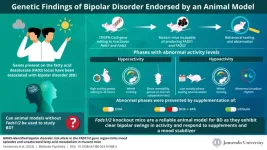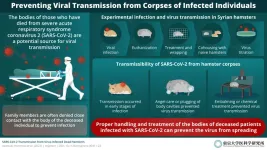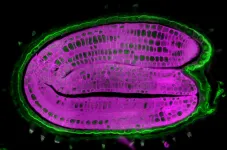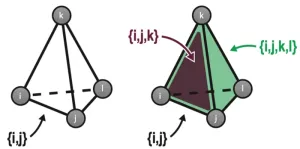(Press-News.org) Bipolar disorder (BD) is a debilitating condition characterized by alternating states of depression (known as depressive episodes) and abnormal excitement or irritability (known as manic episodes). Large-scale genome-wide association studies (GWASs) have revealed that variations in the genes present on the fatty acid desaturase (FADS) locus are linked to an increased risk of BD. Enzymes coded by FADS genes—FADS1 and FADS2—convert or "biosynthesize" omega-3 fatty acids into the different forms required by the human body. Omega-3 fatty acids like eicosapentaenoic acid (EPA) and docosahexaenoic acid (DHA) are crucial for the brain to function, and a reduction in the synthesizing activity of these molecules seems to increase susceptibility to bipolar mood swings.
Research on most diseases involves establishment of an animal model of the disease. So, keeping this knowledge in mind, a team of researchers including Dr. Takaoki Kasahara and Hirona Yamamoto from RIKEN Brain Science Institute and Dr. Tadafumi Kato from Juntendo University in Japan, used CRISPR-Cas9 gene editing to create mutant mice that lack both Fads1 and Fads2 genes. They then tested these models to see if they could serve as an animal model for BD. Their tests involved behavioral analyses and systematic observation of these mice over six months, to identify behavioral changes caused by the mutation. Their findings are detailed in a study published on 21 February 2023 in Molecular Psychiatry.
The mice showed bipolar swings in behavior, featuring phases of abnormally low activity and phases of hyperactivity. Dr. Kato tells us, "The hyperactivity episodes, in which activity was far above the norm, usually lasted half a day". During these episodes, the mice spent an increased amount of time running on wheels and were considerably less likely to remain still during tail suspension tests. Immobility during tail suspension tests is a widely used measure for depression-like behavior in mice.
Phases of low activity or "hypoactivity", in which the mice exhibited low physical activity and spent an abnormally short period of time running on wheels, lasted much longer in the mutants—usually several weeks. "Unlike other locomotor activities, wheel running in mice is a strongly goal-directed behavior having a significant reward value; thus, a reduction in wheel running is associated with markedly diminished pleasure—anhedonia—a core symptom of a depressive episode," Dr. Kato explains. Mutant mice also exhibited abnormal circadian rhythms during hypoactivity episodes. Circadian rhythm is the cyclical pattern of physiological changes that normally coincides with daytime and night-time; it affects our sleep pattern.
To ascertain whether behavioral changes can be reversed by increasing the levels of omega-3 fatty acids, the researchers fed mutant mice supplements containing DHA or a combination of DHA and EPA. The occurrence of periods with abnormally low activity in mice reduced considerably when EPA and DHA were supplemented. Administration of lithium, a mood stabilizer that is widely used to treat manic and depressive episodes in bipolar patients, had a similar effect on mutant mice. All of these indicate how similar BD in these mice models was to BD seen in humans.
Further, the researchers observed mice that lacked FADS enzymes exclusively in the brain to check if their behavioral changes can be attributed to molecular changes in brain cells. However, these mice failed to show bipolar swings in activity similar to mice that lacked FADS completely.
The study's findings suggest that mutant mice lacking Fads1/2 may be helpful as an animal model to study the molecular roots of BD and the development and regulation of mood swings seen in the disorder. Moreover, since these mice respond positively to omega-3 fatty acid supplements and a mood stabilizer, they may help develop new treatments for BD.
END
Researchers create mutant mice to study bipolar disorder
Mice lacking FADS1/2—genes which have been associated with bipolar disorder—show behavioral swings between low and high activity phases.
2023-03-07
ELSE PRESS RELEASES FROM THIS DATE:
New breakthrough enables perfectly secure digital communications
2023-03-07
Researchers have achieved a breakthrough to enable ‘perfectly secure’ hidden communications for the first time.
The method uses new advances in information theory methods to conceal one piece of content inside another in a way that cannot be detected.
This may have strong implications for information security, besides further applications in data compression and storage.
A group of researchers has achieved a breakthrough in secure communications by developing an algorithm that conceals sensitive information so effectively that it is impossible to detect that anything has been hidden.
The team, led by ...
CNIO researchers propose biomarkers to select breast cancer patients who could benefit from denosumab treatment
2023-03-07
The study supports the therapeutic benefit of this drug in postmenopausal patients with hormone-receptor negative breast tumours and RANK protein expression.
"These results revive the option of starting clinical trials of denosumab in breast cancer by selecting patients," says Eva González-Suarez, CNIO researcher and lead author.
The results are published today in the scientific journal EMBO Molecular Medicine.
The drug denosumab is currently used to treat osteoporosis and bone metastases. For more than a decade, its potential therapeutic benefit in the treatment of breast cancer has also been studied. However, due to conflicting clinical ...
The planet that could end life on Earth
2023-03-07
A terrestrial planet hovering between Mars and Jupiter would be able to push Earth out of the solar system and wipe out life on this planet, according to a UC Riverside experiment.
UCR astrophysicist Stephen Kane explained that his experiment was meant to address two notable gaps in planetary science.
The first is the gap in our solar system between the size of terrestrial and giant gas planets. The largest terrestrial planet is Earth, and the smallest gas giant is Neptune, which is four times wider and 17 times more massive than Earth. There is nothing in between.
“In other star ...
Scientists suggest guidelines to prevent SARS-CoV-2 transmission from deceased individuals
2023-03-07
Their findings highlight that embalming or "angel care" can effectively prevent virus transmission, to allow family members to say goodbye
During the pandemic, COVID-19 control measures in several countries prevented family members from coming into contact with loved ones who died from the infection. This had an impact on cremation practices and caused emotional distress. Researchers from Japan have now shown that, while deceased SARS-CoV-2-infected individuals may be a potential source of the ...
An internal thermometer tells the seeds when to germinate
2023-03-07
Germination is a crucial stage in the life of a plant as it will leave the stage of seed resistant to various environmental constraints (climatic conditions, absence of nutritive elements, etc.) to become a seedling much more vulnerable. The survival of the young plant depends on the timing of this transition. It is therefore essential that this stage be finely controlled. A Swiss team, led by scientists from the University of Geneva (UNIGE), has discovered the internal thermometer of seeds that can delay or even block germination if temperatures are too high for the future seedling. This work could help optimize plant growth in a context of global warming. These results can be ...
Study reveals limitations in evaluating gene editing technology in human embryos
2023-03-07
A commonly used scientific method to analyze a tiny amount of DNA in early human embryos fails to accurately reflect gene edits, according to new research led by scientists at Oregon Health & Science University.
The study, published today in the journal Nature Communications, involved sequencing the genomes of early human embryos that had undergone genome editing using the gene-editing tool CRISPR. The work calls into question the accuracy of a DNA-reading procedure that relies on amplifying a small amount of DNA for purposes of genetic testing.
In addition, the study reveals that gene editing to correct disease-causing mutations in early human embryos can also lead to unintended ...
Keck Medicine of USC names Ikenna (Ike) Mmeje president and CEO of USC Arcadia Hospital
2023-03-07
LOS ANGELES — Keck Medicine of USC has named Ikenna (Ike) Mmeje president and CEO of USC Arcadia Hospital (USC-AH), effective March 13.
In this position, Mmeje will further the health system’s mission to expand access to specialized health care and research to the San Gabriel Valley and beyond. He will oversee all management and operations of the hospital, including corporate compliance, strategic plan implementation and fundraising.
“Mmeje will utilize his wealth of knowledge and experience running complex, high-performing hospitals in his new role leading USC Arcadia Hospital,” said Rod Hanners, CEO of Keck Medicine.
Mmeje replaces current ...
What makes a neural network remember?
2023-03-07
Computer models are an important tool for studying how the brain makes and stores memories and other types of complex information. But creating such models is a tricky business. Somehow, a symphony of signals – both biochemical and electrical – and a tangle of connections between neurons and other cell types creates the hardware for memories to take hold. Yet because neuroscientists don’t fully understand the underlying biology of the brain, encoding the process into a computer model in order to study it further has been a challenge.
Now, ...
How do microbes live off light?
2023-03-07
Plants convert light into a form of energy that they can use – a molecule called adenosine triphosphate (ATP) – through photosynthesis. This is a complex process that also produces sugar, which the plant can use for energy later, and oxygen. Some bacteria that live in the light-exposed layers of water sources can also convert light to ATP, but the process they use is simpler and less efficient than photosynthesis. Nonetheless, Technion - Israel Institute of Technology researchers now find this process isn’t as straightforward and limited as was previously thought.
Rhodopsins are the light-driven proton pumps ...
Commercial water purification system may have caused pathogen infection in 4 hospitalized patients
2023-03-07
1. Commercial water purification system may have caused pathogen infection in 4 hospitalized patients
Abstract: https://www.acpjournals.org/doi/10.7326/M22-3306
URL goes live when the embargo lifts
A study of 4 cardiac surgery patients in one hospital found that they developed Mycobacterium abscessus infections, a multidrug-resistant nontuberculous mycobacteria, potentially due to a commercial water purifier. The water purifier had been installed in the hospital to improve water palatability but was inadvertently removing chlorine from the supply lines feeding ice and water machines in the affected area of ...
LAST 30 PRESS RELEASES:
National Reactor Innovation Center opens Molten Salt Thermophysical Examination Capability at INL
International Progressive MS Alliance awards €6.9 million to three studies researching therapies to address common symptoms of progressive MS
Can your soil’s color predict its health?
Biochar nanomaterials could transform medicine, energy, and climate solutions
Turning waste into power: scientists convert discarded phone batteries and industrial lignin into high-performance sodium battery materials
PhD student maps mysterious upper atmosphere of Uranus for the first time
Idaho National Laboratory to accelerate nuclear energy deployment with NVIDIA AI through the Genesis Mission
Blood test could help guide treatment decisions in germ cell tumors
New ‘scimitar-crested’ Spinosaurus species discovered in the central Sahara
“Cyborg” pancreatic organoids can monitor the maturation of islet cells
Technique to extract concepts from AI models can help steer and monitor model outputs
Study clarifies the cancer genome in domestic cats
Crested Spinosaurus fossil was aquatic, but lived 1,000 kilometers from the Tethys Sea
MULTI-evolve: Rapid evolution of complex multi-mutant proteins
A new method to steer AI output uncovers vulnerabilities and potential improvements
Why some objects in space look like snowmen
Flickering glacial climate may have shaped early human evolution
First AHA/ACC acute pulmonary embolism guideline: prompt diagnosis and treatment are key
Could “cyborg” transplants replace pancreatic tissue damaged by diabetes?
Hearing a molecule’s solo performance
Justice after trauma? Race, red tape keep sexual assault victims from compensation
Columbia researchers awarded ARPA-H funding to speed diagnosis of lymphatic disorders
James R. Downing, MD, to step down as president and CEO of St. Jude Children’s Research Hospital in late 2026
A remote-controlled CAR-T for safer immunotherapy
UT College of Veterinary Medicine dean elected Fellow of the American Academy of Microbiology
AERA selects 34 exemplary scholars as 2026 Fellows
Similar kinases play distinct roles in the brain
New research takes first step toward advance warnings of space weather
Scientists unlock a massive new ‘color palette’ for biomedical research by synthesizing non-natural amino acids
Brain cells drive endurance gains after exercise
[Press-News.org] Researchers create mutant mice to study bipolar disorderMice lacking FADS1/2—genes which have been associated with bipolar disorder—show behavioral swings between low and high activity phases.







